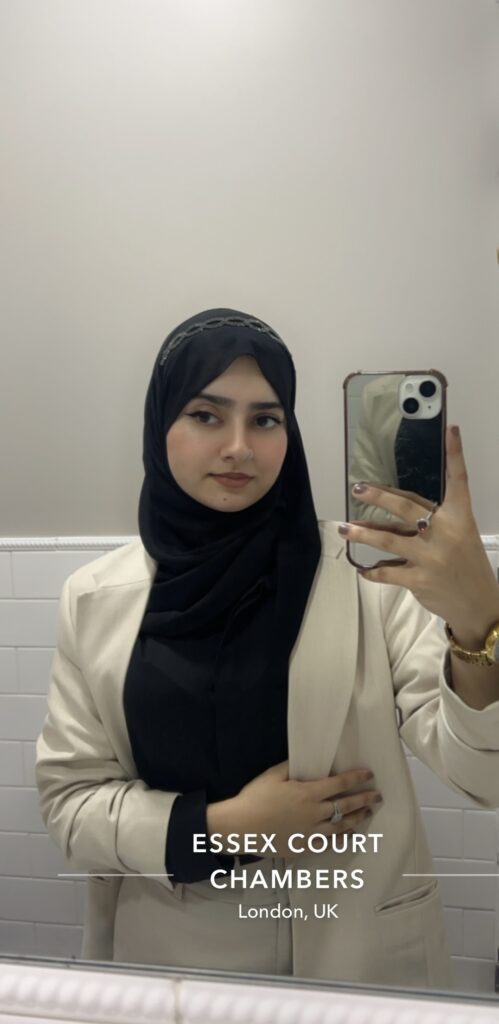Last year we chose Ayesha Wadair as our shortlisted candidate to be considered by Middle Temple for their Access to the Bar Award. The Middle Temple Access to the Bar Awards aim to reach able students from backgrounds which do not traditionally encourage aspirations for a career at the Bar and help them to make an informed choice about their opportunities.
The scheme provides two funded weeks (£350 per week) of work experience every summer to both undergraduates and postgraduates from disadvantaged backgrounds. One week is spent shadowing a judge in court (this is called marshalling) and the other week in Chambers with a barrister. Candidates will also receive invitations to networking events.
Here, Ayesha answers some questions on her experience and we detail more about the application process at the bottom of the article.
The City Law School is seeking applications for the 2024/25 Access to the Bar Award. Simply read the guidance note, complete the application form (both found via the Middle Temple website), and send it to Romilly.Edge.1@city.ac.uk by 1pm on 2nd December 2024 to be considered.

Ayesha, tell us about what prompted you to apply.
I initially applied for the Access to the Bar Award in my second year of university but was unsuccessful. However, with the encouragement and support of the lecturers at City, University of London, I decided to reapply in my third year.
The primary reason for applying was my determination not to miss out on such a valuable opportunity. As an ambitious individual aspiring to become a barrister, I recognised the importance of gaining practical experience in the legal field. When this opportunity arose, I seized it as a critical step toward achieving my career goals.
What did the Access to the Bar Award offer you, and what did you learn from your experience?
The Access to the Bar Award provided me with financial support through a bursary, which covered my travel and lunches during the experience. This allowed me to fully immerse myself in the program without financial stress.
The award facilitated a two-week mini-pupillage: the first week at chambers, working with three different barristers, and the second week shadowing a judge at the Royal Courts of Justice. The experience was transformative—I gained insights into advocacy, case preparation, and judicial reasoning. A highlight was attending a dinner at Middle Temple with the judge, which underscored the sense of community and tradition within the Bar. This experience solidified my ambition to become a barrister by giving me a firsthand understanding of the demands and rewards of the profession.
Could you talk through how the application process worked? What was the timeframe? What support did you receive from City?
The application process was highly competitive. City University initially shortlisted candidates through an internal interview process, providing feedback to those who weren’t selected and helping the shortlisted candidates refine their applications. Once my application was forwarded to Middle Temple, it became part of a national pool where only a select number of candidates out of 18 were chosen.
The process took about a month in total, from initial submission to final decision. I received significant support from City, including personalised feedback, mentoring, and guidance on how to strengthen my application. My mentor at City played a crucial role in preparing me for the final stage, ensuring my application and interview performance reflected my skills and experiences effectively.
How did you prepare for your interview with Middle Temple?
To prepare, I drew on my past experiences advocating for vulnerable individuals, such as interpreting police reports and assisting with legal processes for those claiming innocence. I practiced articulating these experiences clearly, showing how they reflected my commitment to justice and my potential as a barrister.
Additionally, I researched Middle Temple’s values and programs to align my answers with their ethos. My mentor at City conducted mock interviews and provided constructive feedback, helping me refine my responses and build confidence.
What advice would you give to those contemplating applying now?
My advice would be don’t underestimate the power of your personal story. Be authentic and highlight experiences that demonstrate your commitment to the legal profession, even if they don’t follow a traditional path.
Use the resources available—mentors, workshops, and feedback from your university—and prepare thoroughly for the interview by practicing answers that are both professional and personal. Finally, believe in your potential. As the first girl in my family to attend university, I initially doubted myself, but embracing my ambition and unique experiences made all the difference.
What do you think really helped your application get the attention it deserved?
I believe the personal connection I made through my application set me apart. I highlighted specific examples of when I advocated for vulnerable individuals, emphasising not just the skills I used but the values I uphold.
Additionally, I tailored my answers to reflect Middle Temple’s ethos, ensuring I demonstrated how my experiences aligned with their vision for aspiring barristers. The mentorship I received from City also helped me polish my application and improve its clarity and impact.
Finally, tell us what you are doing this academic year and what’s next for you.
This year, I’m pursuing a master’s degree in law at City, focusing on fraud and money laundering. I am also volunteering at Richmond Law Clinic to stay connected with practical legal work and continue developing my advocacy skills.
In the short term, I am seeking a paralegal or legal assistant role to gain professional experience and fund my studies. Long-term, I aim to secure a pupillage after completing my studies and begin building my career as a barrister.
Here’s what Middle Temple say about eligibility:
The scheme is open to undergraduate and postgraduate students who:
- are available to participate from the final week of June to the end of the first week of July.
- are in the second, third or fourth year of a qualifying law degree, or taking the Graduate Diploma in Law or an equivalent conversion course. Postgraduates with a qualifying law degree may also apply.
- have little or no family history of higher or professional education.
- completed secondary education in a state school. (In exceptional circumstances, students who attended secondary education in a fee-paying school may be considered.)
- are not a member of the Honourable Society of Inner Temple, The Honourable Society of Lincoln’s Inn or the Honourable Society of Gray’s Inn. Please Note: Recipients of the Inner Temple Pegasus Access and Support Scheme will not be eligible to receive an Access to the Bar Award.

